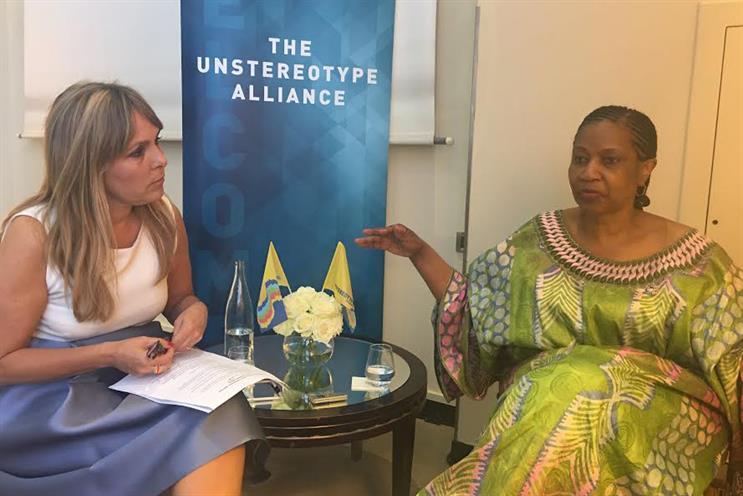
"The complexity of gender inequality is such that it needs a comprehensive collaborative response, and size matters. The coming together of the industry to work on this initiative I find very exciting," said Mlambo-Ngcuka, executive director of UN Women at the Cannes Lions Festival.
She is speaking to ±±ľ©Čüłµpk10 an hour after Unilever sat around the table with UN Women and various partners including WPP, Mars, Procter & Gamble, Facebook and Google to launch the Unstereotype Alliance.
The initiative, first announced by Unilever chief marketing officer Keith Weed last year, is an industry coalition examining the evolution of female role model in advertising and eradicating sexist stereotypes from all advertising and marketing content. Unilever executive vice-president global marketing Aline Santos now leads both the initiative and the Alliance.
Ngcuka adds: "When I looked around the table and found that the average marketing and advertising spend of every single company is 40 times my overall budget, for everything I want to achieve, I knew that this considerable muscle and resources has the power to bring about the change we need when it comes to fighting female inequity. All I have to do is play the referee."
So how difficult was it to get competitors like P&G, Mars and all the major agency holding company chiefs and tech giants to work together on a drive that was first created by one of the world’s major advertisers?
Both Santos and Mlambo-Ngcuka conceded that the involvement and muscle of UN was perhaps one of the key reasons for the industry heavyweights to join in. "I also want to add that our seriousness around the project was never in doubt, and with Mlambo-Ngcuka on board — a known and trusted figure in the area of women’s rights — we were able to draw upon a dream team of industry names who are ready to work together to help women’s advancement," Santos explains.
For Mlambo-Ngcuka this alliance is probably more straightforward than the political machinations she is used to. Something she agrees with: "I have to take political parties from different sides and say let’s talk about women agenda above your differences, because if we’re talking about serious issues like rape we cannot take party position. Sitting across the table today, we all agreed we want the same things — we all want girls to be at school, we all don’t want child marriage etc. And when businesses like Unilever that are good corporate citizens are aspiring for all these goals, and getting other businesses together, I think a lot of these aspirations can be."
A longtime champion of women’s rights, Mlambo-Ngcuka launched the HeForShe campaign in 2014. She began her career as a teacher, worked as deputy minister in South Africa’s department of trade and industry and minister of minerals and energy, and later as a co-ordinator at the World YWCA in Geneva, where she created a global programme for young women.
The Unstereotype Alliance has marked five areas of progress to work towards — establish a code of conduct; have clear accountable measurement standards about the outcomes of advertising; collaborate in terms of best practices; create compelling narratives in terms of business effectiveness and encourage the rest of the industry to join; and have a mandate of internal change that challenges businesses on its recruitment and hiring policies etc.
Santos stressed that the Alliance members will not be allowed to mark each other’s homework when it comes to female empowerment, instead the UN will continue to keep them in check. "It won’t be a case of Unilever telling off P&G if they were to set a foot wrong, it will go against the principle of this initiative."
Mlambo-Ngcuka added: "The message we’re trying to send is that yes we recognise your competitive strengths, but you also have collaborative advantages where you could bring together your different strengths to create real change.
"What I would like brands to look at — is the number of women being portrayed in positions of strength rather than in position of weakness and dependence and also projecting women in careers where women are under-represented, to help create role models. Advertisers have to take some responsibility not only because they are selling a product but because it is a good message to send to the society. Be good corporate citizens. It is not just about making money but also doing good for the society."
The UN is also commissioning an annual study – to which majority of the Alliance members are committed to participate – about gender attitudes. The aim of the research would be to measure the "good work" by advertising in trying to impact positive gender attitudes.



.jpg)
.jpeg)
